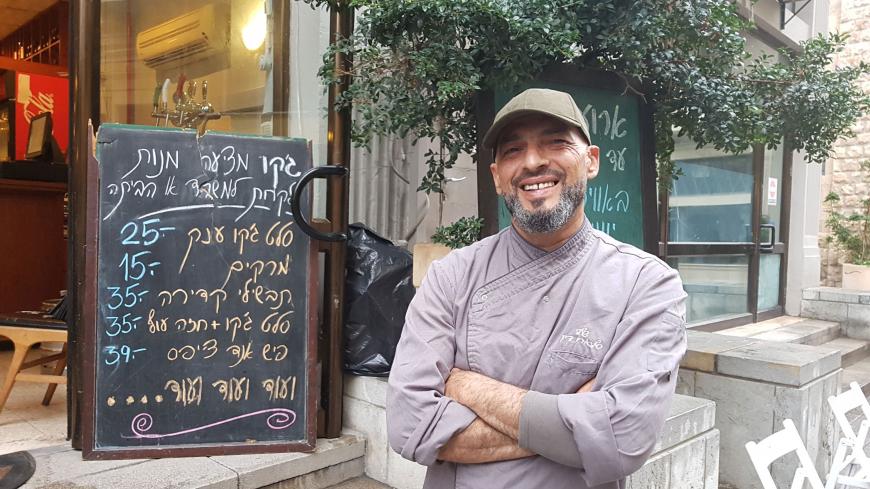HAIFA- Salah Kordi’s lahmacun briefly transported me back to Istanbul’s Besiktas neighborhood and the restaurant below the apartment where I used to buy Turkish meat pizzas to go. But while the spices and crisp flatbread were familiar, Kordi substituted ground beef with amberjack caught off the coast of his hometown of Jaffa.
Kordi, a chef at Al-Ashi restaurant in Jaffa, was one of dozens of Arab and Jewish chefs who descended Dec. 6-7 on Haifa’s downtown for the fourth annual A-Sham Arab Food Festival. This year’s festival featured Turkish and Ottoman-inspired dishes at 32 different restaurants and venues in the revitalized area around the city’s port.
“Listen, the Ottomans were here 400 years,” Kordi told Al-Monitor. “My grandmother cooked this food: stuffed vegetables, stuffed grape leaves, shishbarak, kishek, lahma ba’ajin, kubbeh” — all traditional Palestinian dishes with influences from around the former Ottoman Empire.
Lahma ba’ajin is the Arabic cognate of the Turkish lahmacun, a flatbread topped with ground meat, herbs and spices. Kordi’s dish pays homage to the popular Turkish street food but gives it a Palestinian twist by incorporating onions and sumac and paper-thin Druze pita instead of thicker dough.
The A-Sham Arab Food Festival is part of a broader, monthlong celebration known as Holiday of Holidays held annually in Haifa in December to mark the Jewish holiday of Hanukkah and Christmas (and Muslim holidays when they intersect with the solar calendar). This year’s events include concerts, performances, pop-up shops, street fairs, art exhibits, lectures, parades and of course food.
Haifa, Israel’s northern port and third-largest city, is approximately 11% Arab and is celebrated for its Jewish-Arab coexistence.
“Our dream was to use food to convey messages to people around Israel and outside Israel, and we thought that this is the basic thing that is shared between people all around the world,” Nof Atamna-Ismaeel, founder of the A-Sham Arab Food Festival, told Al-Monitor.
Atamna-Ismaeel, a microbiologist by profession, said her love affair with cooking began when she was four years old and would cook with her grandmother. She went on to become the first Arab winner of TV show "MasterChef Israel" in 2014. Later that year, she launched the A-Sham festival to bring Israeli and Arab chefs together, pairing them in the kitchen to foster Jewish-Arab coexistence. But now, she said, “It's happening so we're not talking about it anymore. I think we have bigger things to talk about.”
This year, the Haifa foodscape featured “the sultans’ feasts of the imperial Ottoman palaces brought to life.” Atamna-Ismaeel said the reason for shifting from Arab to Turkish cuisine is to demonstrate that while Israeli-Turkish relations may be strained, cultural ties between the peoples are steadfast.
Relations between Israel and Turkey have witnessed a downturn in the years since the 2010 Mavi Marmara incident, in which Israeli troops boarded a Turkish-flagged ship attempting to break the blockade by Israel and Egypt on the Gaza Strip. Nine activists, many of them Turks, died in the incident, and 10 Israeli soldiers were wounded. Turkey and Israel restored full diplomatic relations in 2016, but Ankara withdrew its ambassador and ordered Israel’s ambassador to leave after deadly clashes on the Israel-Gaza border in May.
“I thought it would be nice to show that we really want them to go back to normal. We want true peace,” Atamna-Ismaeel said.
In addition to the Turkish food, the festival included lectures about Ottoman cuisine, tours of Ottoman architecture in Haifa, Turkish singers, pop-up shops selling Turkish ceramics, lamps and sweets, and two visiting Turkish chefs preparing their dishes at local restaurants.
Maksut Askar of Istanbul’s Neolokal and Kemal Demirasal of Alancha in Alacati, a popular holiday resort near Izmir, brought a taste of the modern Turkish culinary scene to Haifa for the festival. Askar told Al-Monitor, “There’s no such thing as Ottoman cuisine. There's no such thing as Turkish cuisine either, because the cuisine is all about what geography gives you.”
Askar said there were many similarities between some varieties of Turkish food and the Levantine cuisine endemic to Israel. Levantine cuisine “is not very different so far from where I am from,” said Askar, who hails from the southern Turkish city of Antakya. “It’s the same lens, it’s the same people.”
Nonetheless, he came to Israel with 36 kilograms (79 pounds) of ingredients to prepare 12 dishes with great exactitude to those found in his Istanbul restaurant. One of his signature dishes, called Hummus and Anatolian Landscapes, was made with local hummus, however.
Demirasal drew from his Aegean coastal cuisine and prepared cacik — his own twist on the Turkish variation of Greek tzatziki — with seafood orzo (similar to pilau, lamb and baklava) at Hanamal 24 restaurant in Haifa.
Askar and Demirasal told Al-Monitor that neither of them faced pressure to boycott the Israeli festival for political reasons, and were proud to attend.
“We are here to prove that people can connect each other through food. It doesn't matter who they are or where they belong. That's what we do,” said Askar, before serving his dishes to a fully booked Rola Levantine Kitchen in Haifa.








